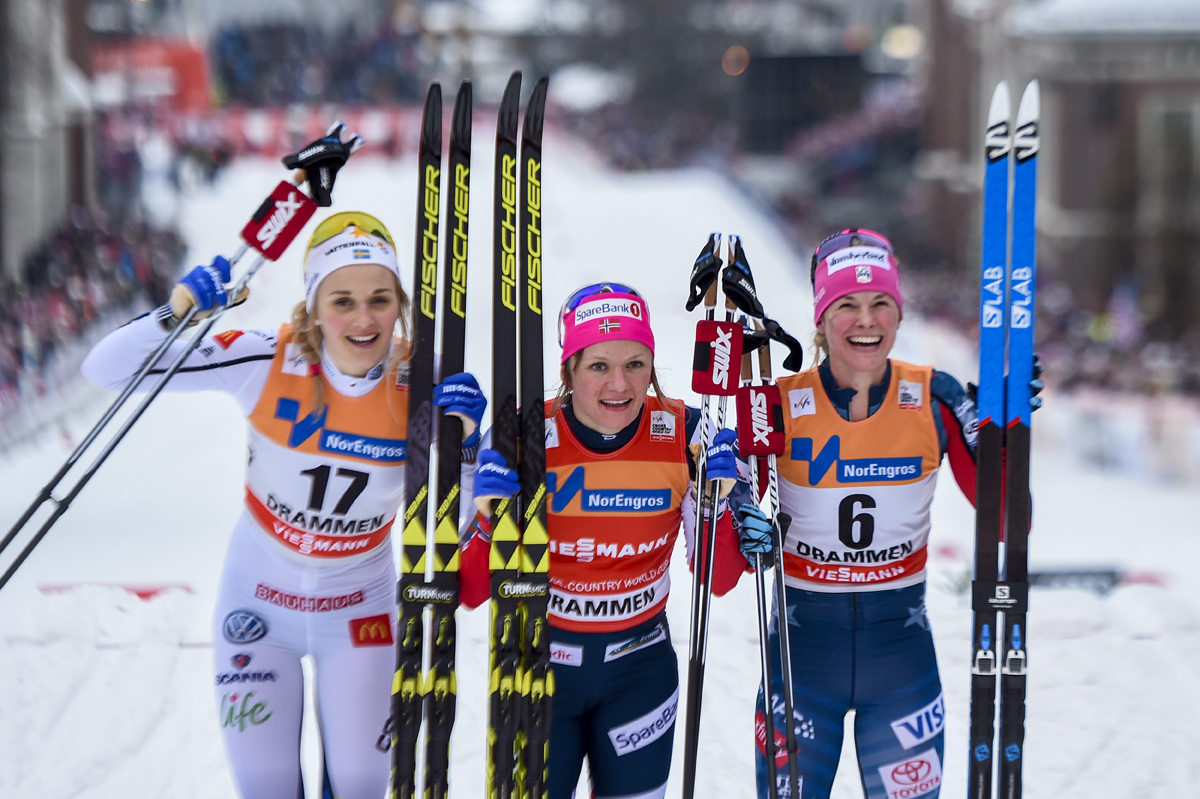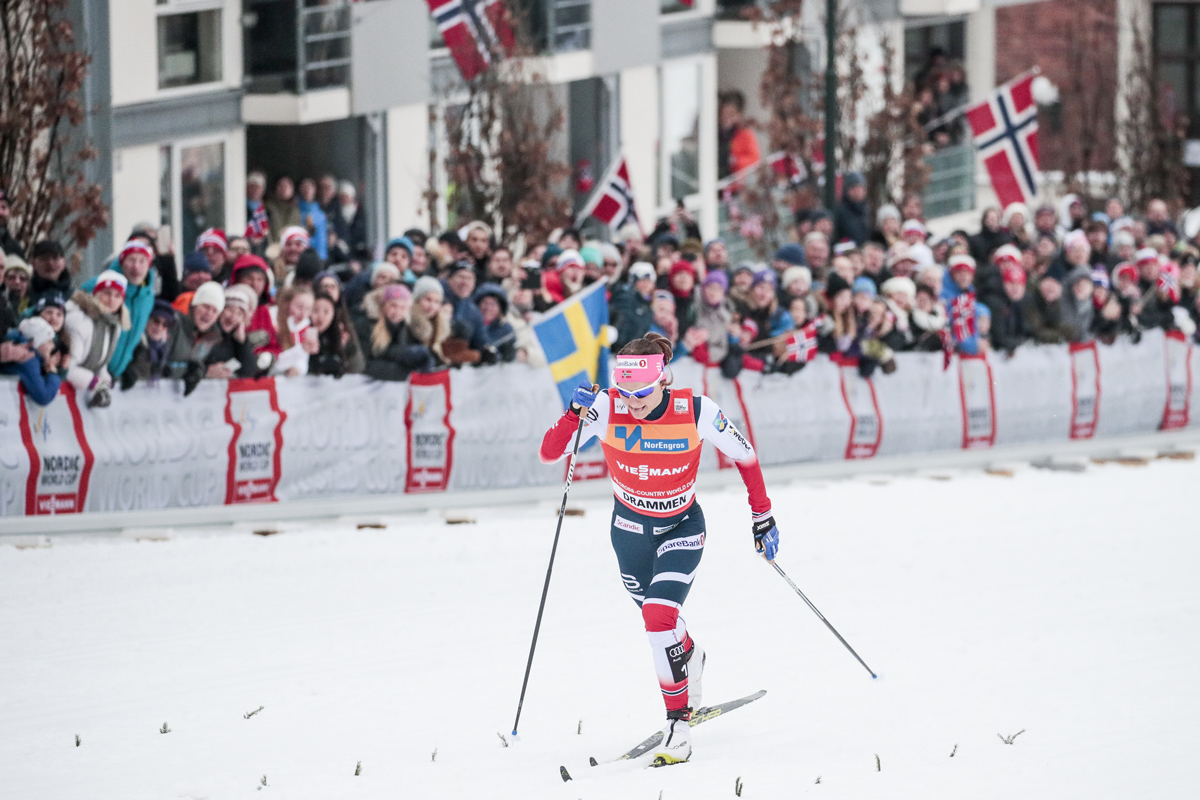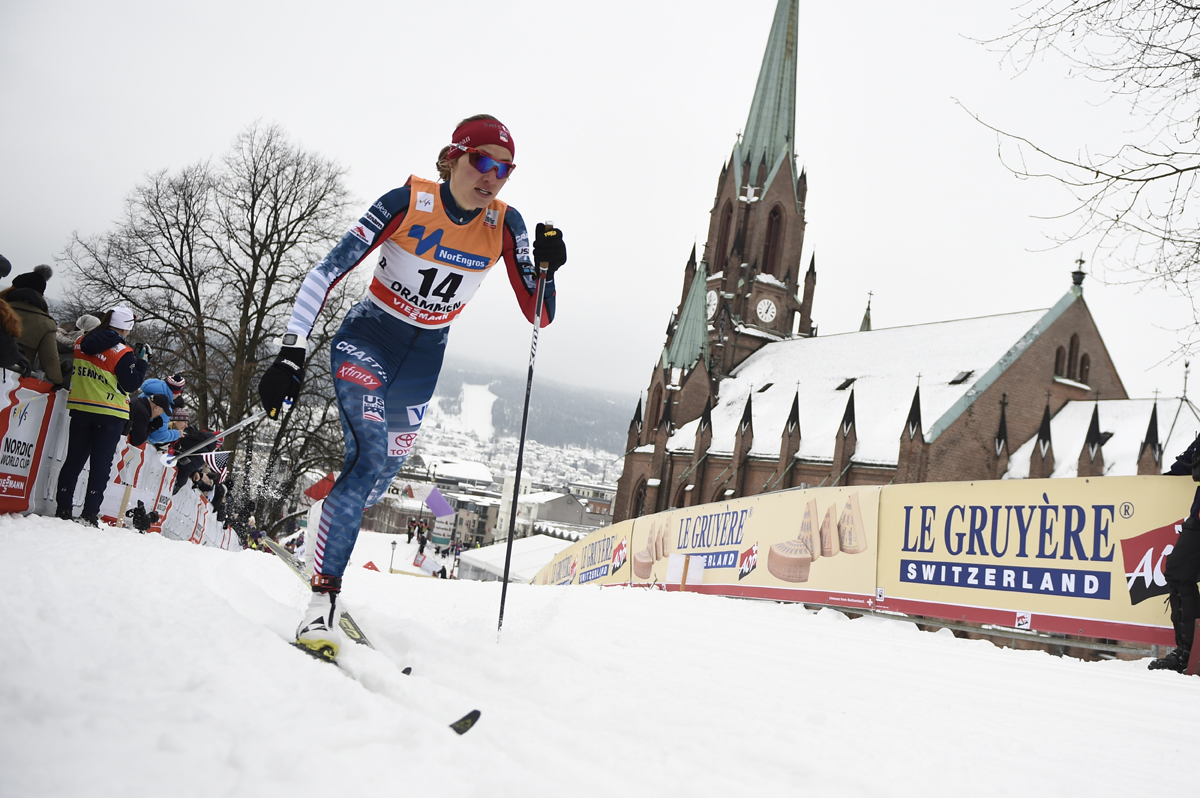
DRAMMEN, Norway — Barring the spectators cheering from their apartment balconies, the most marked aspect of Wednesday’s 1.2-kilometer classic sprint course was the finish line. It crosscut the top of a 15-meter climb.
Throughout the day, no skier closed out Drammen’s uphill finish better than Norway’s Maiken Caspersen Falla. After winning the day’s qualifier in a time of 3:19.44 minutes, Falla won her quarterfinal in photo-finish fashion and outlunged Sweden’s Stina Nilsson to place first their semifinal.
In the final, Falla once again proved her form in the uphill. She strode past Russia’s Natalia Nepryaeva and Nilsson to take the win in a time of 3:10.18. The closest any competitor came to the Norwegian was Nilsson, 1.39 seconds back.

The first-place success in Drammen is Falla’s standard. From 2014 to 2016, she won three World Cup sprint races held in the city, all of them classic. (Falla missed qualifying by one place in 31st in last year’s Drammen classic sprint.)
“It’s my fourth win here and I am so happy with the way I am feeling,” Falla said, according to an International Ski Federation (FIS) press release. “I think my battery is finally fully charged. I was a bit tired after the Olympics and I haven’t trained very much. But I can feel that my body is back and it’s great to get another win here and almost secure my third Crystal Globe.”
Falla now leads the Sprint World Cup with 543 points, while Nilsson trails in second by 48 points. Only one sprint race remains this season, a freestyle competition that is featured in next weekend’s World Cup Finals in Falun, Sweden. With her second-place finish on Wednesday, Nilsson could still snag the Sprint Crystal Globe from Falla, as 50 points remain for a win in that race.
“I didn’t qualify so well so I was a bit worried about how today would go,” said Nilsson, who qualified in 17th, according to a FIS press release. “Maiken was just too strong for me today but I am happy that I felt better and better as the rounds happened today … and in the end I can say that I am satisfied.”
In a dramatic closeout, U.S. skier Jessie Diggins came from behind to claim third (+1.88), despite appearing out of podium contention with 150-meters to go. The American’s advancement to the final itself was up in the air until the jury ruled a technical violation for Switzerland’s Nadine Fähndrich.

After racing in semifinal 1, Diggins finished in third behind Falla and Nilsson. Semifinal 2 was the faster of the two semis, and produced the day’s two Lucky Losers before Fähndrich’s yelllow card. The Swiss skier lost her automatic qualification spot, giving Diggins a shot as the final lucky loser in the final.
At the start of the women’s final, the American was positioned in sixth, trailing Slovenia’s Katja Visnar in fifth, Finland’s Krista Pärmäkoski in fourth, Nilsson in third, Nepryaeva in second, and Falla in first. While she had burned off the front in the start of her quarterfinal, Diggins played a safer start in the final.
“Last year [in Drammen] I got swallowed up in the draft and then broke my pole,” Diggins told FasterSkier during an in-person interview after. “So this year I was trying to be really smart, be aware of where other bodies were and keep myself out of any tangles; just ski a smart, clean race.”
“In the final I started out in the back thinking ‘OK, just ski relaxed, stay in contact,’ ” she continued. “Then I was really able to go for it and put the hammer on in the last 50 meters.”
Taking the opposite tactic of Diggins, Falla forced a fast pace in the front. By the top of the first climb the Norwegian had a one-meter gap over Nilsson and Nepryaeva, who were positioned in second and third, respectively. Another half meter behind the Russian and Swede were Diggins and Pärmäkoski.
Heading into the descent, Falla held her capacious lead. About a meter behind the Norwegian, Nepryaeva slid ahead of Nilsson. Diggins, who had surged around Pärmäkoski on the hill’s crest, took a few double poles midway through the descent’s two twists in an attempt to close the gap separating her from the top three.
By the bottom of the hill, Nepryaeva had closed in on Falla. The Russian and Norwegian went head-to-head as they approached the course’s final hairpin turn. Chasing the backs of their ski tails was Nilsson. Fighting to hold onto Nilsson was Diggins.
Coming out of the hairpin, Russia had the lead, followed closely by Norway and Sweden. The American clung tenaciously, though now two ski lengths behind the finals top three leaders with less than 150-meters to go.
“Admittedly I have to say that while I will never count Jessie out, it certainly looked like she was on her way to fourth,” U.S. Ski Team Women’s Coach Matt Whitcomb told FasterSkier during an in-person interview. “I think she surprised just about everyone out there today.”

In the final climb, Falla was the first to pass Nepryaeva on the left. Nilsson followed suit, and then Diggins. By a mere 0.44 seconds, Diggins edged Nepryaeva, earning her first World Cup classic sprint podium.
“It was so cool because classic sprinting — especially on a course like this, in deep sugary snow that is falling apart — is arguably my all-time weakest event; to be able to finally get a podium, that’s something I’ve been after for many years,” Diggins said.
Wednesday’s classic sprint was Diggins’s first race back since last month’s Olympics in PyeongChang, South Korea. Following the Games, she and her teammate Kikkan Randall returned to the U.S. for what Whitcomb referred to as essentially a “media tour” thanks to the duo’s Olympic gold medal in the team sprint. Both returned to Europe last weekend, though neither raced the World Cup races that took place in Lahti, Finland on Saturday and Sunday.
“Not for a minute, when we saw them after we arrived from Lahti, did we think that was a mistake,” Whitcomb said of the decision for Diggins and Randall to return to the U.S. “At the end of the day, had it been a mistake, we didn’t care. We wanted that story told.”
“I think it was really important that I had that rest. I clearly needed it and I was able to come back feeling snappy,” Diggins added.
Diggins is now ranked third in the Overall World Cup standings, 375 points behind Norway’s Heidi Weng in first and 179 points behind Norway’s Ingvild Flugstad Østberg in second. She is 35 points ahead of Pärmäkoski in fourth.
Following Diggins on Wednesday, Nepryaeva crossed in fourth (+2.32), Pärmäkoski fifth (+8.85) and Visnar sixth (+20.70).
Rounding out the top 10 was Sweden’s Hanna Falk in seventh, Østberg in eighth, Norway’s Tiril Udnes Weng in ninth, and Norway’s Thea Krokan Murud in 10th.

Two more Americans qualified for Wednesday’s classic sprints, with Sadie Bjornsen placing 21st after finishing fifth in her quarterfinal, 9.24 seconds behind Fähndrich in first. Sophie Caldwell raced in the first quarterfinal with Falla, where she finished sixth, 10.6 seconds back, for 27th overall.
U.S. skier Ida Sargent finished 47th in the qualifier, followed by Rosie Brennan in 48th, Randall in 50th, and Kaitlynn Miller in 53rd.
Canada’s Emily Nishikawa placed 52nd and Dahria Beatty 55th.
— Chelsea Little, Harald Zimmer and Alex Kochon contributed

Gabby Naranja
Gabby Naranja considers herself a true Mainer, having grown up in the northern most part of the state playing hockey and roofing houses with her five brothers. She graduated from Bates College where she ran cross-country, track, and nordic skied. She spent this past winter in Europe and is currently in Montana enjoying all that the U.S. northwest has to offer.



